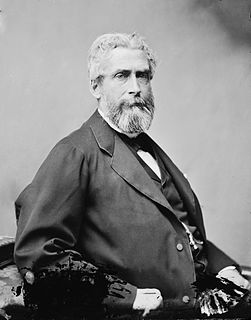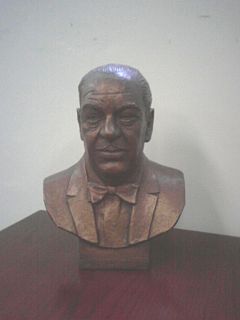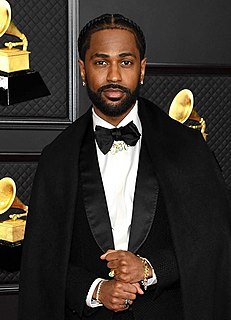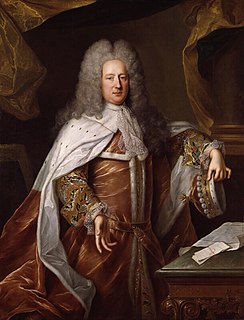A Quote by Greg Koukl
According to "matter-ism," matter is all that exists. The only things that are real are physical things in motion governed by natural law. That story starts, "In the beginning were the particles," or, as one famous person put it, "The cosmos is all that is, or ever was, or ever will be." No God. No souls. No Heaven or Hell. No miracles. No transcendent morality. Just molecules in motion following the patterns of natural law. This is the story that most atheists, most "skeptics," most humanists, and most Marxists believe is true.
Quote Topics
According
Atheists
Beginning
Believe
Cosmos
Ever
Exists
Famous
Famous Person
Following
God
Governed
Heaven
Heaven Or Hell
Hell
In The Beginning
Just
Law
Matter
Miracles
Molecules
Morality
Most
Motion
Natural
Natural Law
Only
Particles
Patterns
Person
Physical
Physical Things
Put
Real
Souls
Starts
Story
The Only Thing
Things
Transcendent
True
Were
Will
Related Quotes
In matter-ism (materialism), there can be nothing wrong with the world since there is no right way for the world to be in the first place. Everything is just matter in motion and that's that. In Mind-ism (monism) there's a different route to the same problem. There cannot be a problem of evil, even in principle, since in Mind-ism even morality is maya; illusion. In neither story, then (if we're to be consistent with their principles), can the issue of evil be raised. But in real life the problem comes up all the time. That's the difficulty.
The finger of the atheists' own divinity, Reason, wrote on the wall the appalling judgments that there is no God; that the universe is only matter in spontaneous motion; and, most grievous word of all, that what men call their souls die with the death of the body, as music dies when the strings are broken.
No man-made law ever, no matter whether derived from the past or projected onto a distant, unforeseeable future, can or should ever be empowered to claim that it is greater than the Natural Law from which it stems and to which it must inevitably return in the eternal rhythm of creation and decline of all things natural.
If I were to give a prize for the single best idea anybody ever had, I'd give it to Darwin for the idea of natural selection - ahead of Newton, ahead of Einstein - because his idea unites the two most disparate features of our universe: the world of purposeless, meaningless matter and motion, particles jostling on the one side, and the world of meaning and purpose, design on the other.
What art Thou then, my God? what, but the Lord God? For who is Lord but the Lord? or who is God save our God? Most highest, most good, most potent, most omnipotent; most merciful, yet most just; most hidden, yet most present; most beautiful, yet most strong; stable, yet incomprehensible; unchangeable, yet all-changing; never new, never old; all-renewing, and bringing age upon the proud, and they know it not; ever working, ever at rest; still gathering, yet nothing lacking; supporting, filling, and overspreading; creating, nourishing, and maturing; seeking, yet having all things.
God knows instantly and effortlessly all matter and all matters, all mind and every mind, all spirit and all spirits, all being and every being, all creaturehood and all creatures, every plurality and all pluralities, all law and every law, all relations, all causes, all thoughts, all mysteries, all enigmas, all feeling, all desires, every unuttered secret, all thrones and dominions, all personalities, all things visible and invisible in heaven and in earth, motion, space, time, life, death, good, evil, heaven, and hell.
Story is the oldest, commonest, most beloved, and most effective form of communication because our life is essentially a story. That's why the Bible is the most realistic of religious books. We can easily ignore or argue away abstractions, but we bump up against concretely real people, things, and events in story, as in life.
I love those historians that are either very simple or most excellent. Such as are between both (which is the most common fashion), it is they that spoil all; they will needs chew our meat for us and take upon them a law to judge, and by consequence to square and incline the story according to their fantasy.
The critical question for our generation—and for every generation— is this: If you could have heaven, with no sickness, and with all the friends you ever had on earth, and all the food you ever liked, and all the leisure activities you ever enjoyed, and all the natural beauties you ever saw, all the physical pleasures you ever tasted, and no human conflict or any natural disasters, could you be satisfied with heaven, if Christ were not there?
No religion ever appeared in the world whose natural tendency was so much directed to promote the peace and happiness of mankind. It makes right reason a law in every possible definition of the word. And therefore, even supposing it to have been purely a human invention, it had been the most amiable and the most useful invention that was ever imposed on mankind for their good.


































